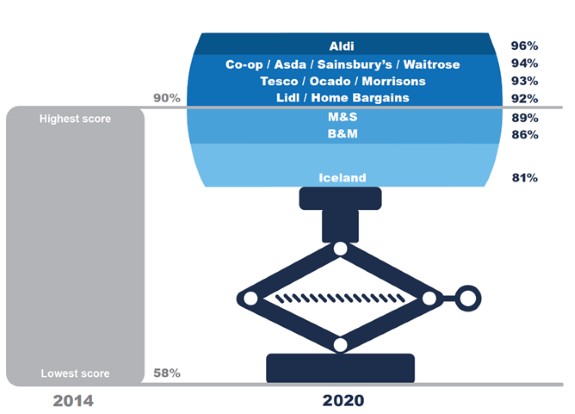The full results of Christine Tacon’s seventh and final Groceries Code Adjudicator (GCA) survey have been published today. They show Aldi continuing its long-running winning streak in terms of compliance (96%) with the Groceries Supply Code of Practice (GSCOP). However, the most significant development was the Co-operative Group’s jump from tenth place in 2019 to second in the latest ranking with a score of 94%.
The big improvement comes after the GCA last year found the society guilty of breaching the Code after an investigation into the way it was delisting suppliers and unilaterally changing supplier agreements. The Co-op was ordered to introduce major changes to its governance and processes after the investigation in 2018, helping it take top place on the ‘most improved’ table in the latest survey.
Overall, the 13 retailers regulated by the GCA showed a high level of Code-compliant behaviour in their relationships with their groceries suppliers.
Only three retailers were rated below 90% for complying consistently well or mostly with the Code; nine are between 92% and 94%; the highest is 96% and the lowest is 81%. This is a significant improvement from the GCA’s first survey in 2014 when compliance ranged from 58% to 90%.
Bottom-placed retailer on overall compliance was Iceland on 81%, followed by B&M on 86% and Marks & Spencer on 89%. TJ Morris – trading as Home Bargains – achieved a 92% rating in its first year as a regulated retailer. Sainsbury’s ranked third on 94%, followed closely by Asda, Waitrose and Tesco.
Tacon said: “This squeezing of performance into significantly higher levels of compliance is testament to the effectiveness and impact of my collaborative approach.
“Aldi should be particularly congratulated for having held the top spot every year for seven consecutive years, but the survey shows the considerable efforts to improve made by all retailers, which are clearly represented in this striking graphic.”

The record compliance ratings are in line with the other headline results of the survey. Early analysis reported this month showed the lowest-ever number of direct suppliers – 36% – had experienced a Code-related issue at any point in the past 12 months, compared to 79% in 2014, and that suppliers had recognised improvements across every issue covered by the Code.
Tacon added: “I am delighted to see how much progress Co-op has made. Last year I spent eight months working with the retailer as it implemented the recommendations made as a result of my investigation.
“It has demonstrated a huge amount of progress in embedding the Code and I have enjoyed working with the Co-op team to ensure that they understood the issues and implemented actions that would prevent the same or similar problems recurring in future.”
Tacon had been due to stand down in June after seven years in the role. However, it was announced last month that she would continue as GCA for a period of up to six months in order to provide “continuity and reassurance” to the sector during the coronavirus outbreak.
She concluded: “I was encouraged to conduct the survey by the retailers even though I was not going to be in office to prioritise or make progress on areas of concern.
“The retailers have recognised the survey’s immense value: they want to know that suppliers are experiencing progress on areas where they have focused and to identify areas where they may need to do more.”
Download a summary of the GCA YouGov 2020 survey results (PDF)
NAM Implications:
- Key is how far supplier-retailer working relationships have come in seven years.
- A pointer for other countries…
- But also food for thought re the improvement of supplier-partner relationships in other parts of the supply chain.




